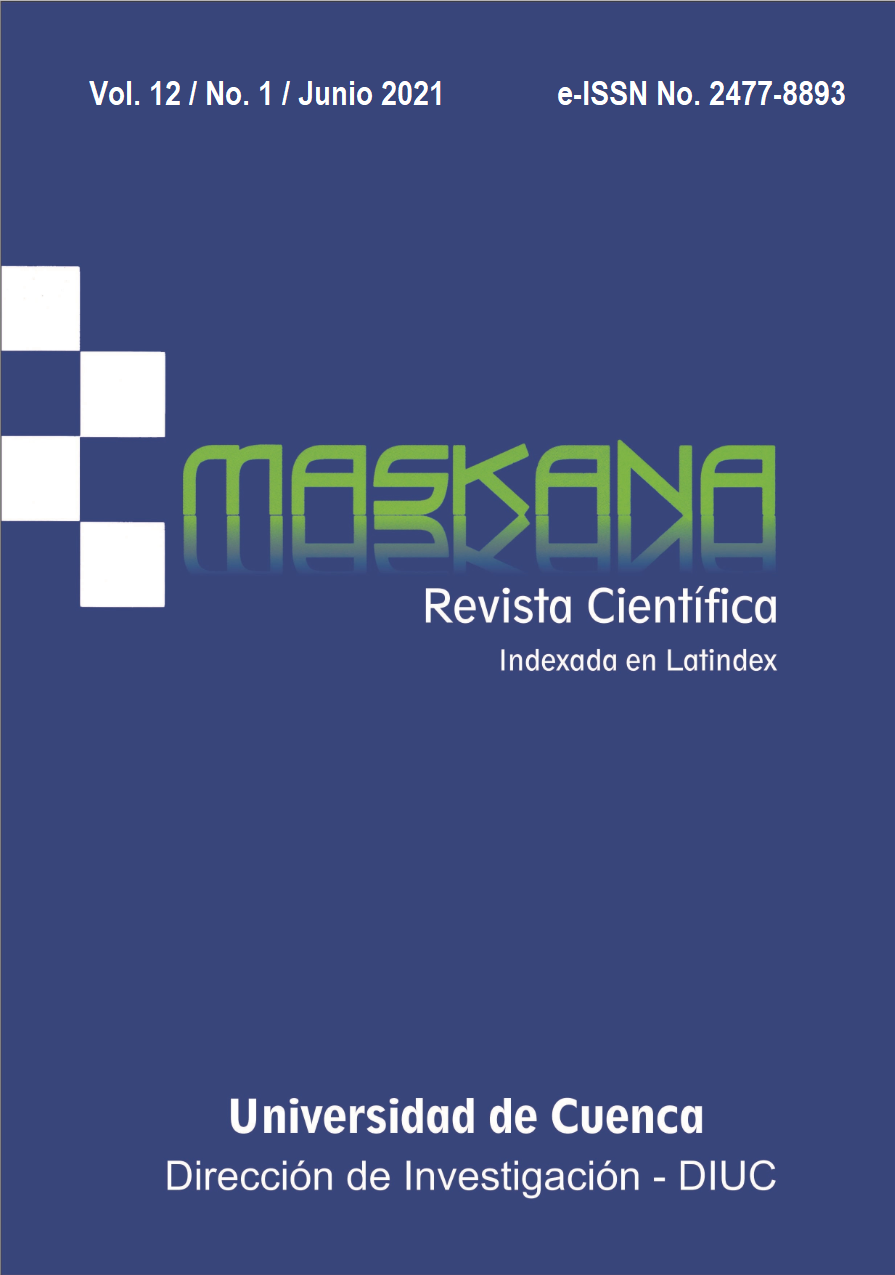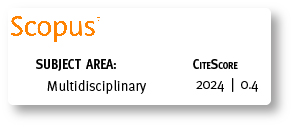Exploratory analysis of the relationship between anxiety and emotional intelligence of university students who are caregivers and non-caregivers during the coronavirus pandemic. Case: Cuenca, Ecuador
DOI:
https://doi.org/10.18537/mskn.12.01.04Abstract
The research examined the relationship between emotional intelligence and anxiety in caregiver and non-caregiver college students during the corona pandemic. Several studies indicate the emergence of mental health risk factors, such as anxiety, during a health emergency. Whereas emotional intelligence could help as a protective factor, it is a question of whether this and other factors differentiate when people act as caregiver. Sixty college students, respectively 28 caregivers and 32 non-caregivers, participated in this study. The research had a descriptive and cross-sectional non-experimental design and used the Wong and Law' Emotional Intelligence Scale (WLEIS) and the Hamilton Anxiety scale as instruments for measuring the relationship between anxiety and emotional intelligence. The results showed that no significant differences exist between the group of caregivers and non-caregivers while a significant correlation was found between anxiety and emotional intelligence levels; higher levels of emotional intelligence produce lower levels of psychic anxiety. The findings of this explorative study suggest considering in future research variables such as resilience and uncertainty.
Downloads
Metrics
References
American Psychiatric Association. (2014). DSM-V (R). American Journal of Psychiatry, 991. https://doi.org/10.1176/appi.books.9780890425596.295735
Bojórquez, C., & Moroyoqui, S. (2020). Relación entre inteligencia emocional percibida y ansiedad en estudiantes universitarios. Espacios, 41(2), 267-278.
Brackett, M. A., & Salovey, P. (2006). Measuring emotional intelligence with the Mayer-Salovery-Caruso Emotional Intelligence Test (MSCEIT). Psicothema, 18(SUPPL.1), 34-41.
Cerquera-Córdoba, A., Matajira-Camacho, Y., & Pabón-Poches, D. (2016). Caracterización de una muestra de cuidadores formales de pacientes con trastorno neurocognitivo mayor en Bucaramanga. Revista Virtual Universidad Católica Del Norte, 1(47), 4-19.
Cerquera, M., & Galvis-Aparicio, M. (2014). Efectos de cuidar personas con Alzheimer: un estudio sobre cuidadores formales e informales. Pensamiento Psicológico, 12(1), 149-167. https://doi.org/10.11144/javerianacali.ppsi12-1.ecpa
Colomeischi, A. A. (2015). Teacher burnout in relation with their emotional intelligence and personality traits. Procedia - Social and Behavioral Sciences, 180, 1067-1073. https://doi.org/10.1016/j.sbspro.2015.02.207
Cotelo-Mosqueira, Mónica. (2015). Estudio piloto: Inteligencia emocional en cuidadores formales, burnout y satisfacción laboral [Universidade da Coruña]. https://ruc.udc.es/dspace/bitstream/handle/2183/14531/CoteloMosqueira_Monica_TFM_ 2015.pdf?sequence=2&isAllowed=y
Faro, A., Bahiano, M. de A., Nakano, T. de C., Reis, C., da Silva, B. F. P., & Vitti, L. S. (2020). COVID-19 and mental health: The emergence of care. Estudos de Psicologia (Campinas), 37, 1-14. PUC de Campinas. https://doi.org/10.1590/1982-0275202037E200074
Fernández-Berrocal, P., & Extremera-Pacheco, N. (2005). La inteligencia emocional y la educación de las emociones desde el modelo de Mayer y Salovey. Revista Interuniversitaria de Formación Del Profesorado, 19(3), 63-93.
González-Rodríguez, M., Cubas, R., Rovella, A. T., & Darias-Herrera, M. (2006). Adaptación española de la escala de intolerancia hacia la incertidumbre: procesos cognitivos, ansiedad y depresión. Psicología y Salud, 16(2), 219-233.
Guerrero-Barona, E., Sánchez-Herrera, S., Moreno-Manso, J., Sosa-Baltasar, D., & Durán-Vinagre, M. (2019). El autoconcepto y su relación con la inteligencia emocional y la ansiedad. Behavioral Psychology/Psicologia Conductual, 27(3), 455-476.
Guevara, L. (2011). La inteligencia emocional. Temas para la Educación, Revista Digital para Profesionales de la Enseñanza, 12, 1-12. Retrieved from https://www.feandalucia.ccoo.es/docu/p5sd7866.pdf
ICD-11. (2018). ICD-11 International classification of diseases for mortality and morbidity statistics. Journal of Chemical Information and Modeling, 53(9), 1689-1699. https://doi.org/10.1017/CBO9781107415324.004
Law, K. S., Wong, C. S., & Song, L. J. (2004). The construct and criterion validity of emotional intelligence and its potential utility for management studies. Journal of Applied Psychology, 89(3), 483-496. https://doi.org/10.1037/0021-9010.89.3.483
Li, W., Yang, Y., Liu, Z. H., Zhao, Y. J., Zhang, Q., Zhang, L., … Xiang, Y. T. (2020). Progression of mental health services during the COVID-19 outbreak in China. International Journal of Biological Sciences, 16, 1732-1738. https://doi.org/10.7150/ijbs.45120
Mamun, M. A., & Griffiths, M. D. (2020). First COVID-19 suicide case in Bangladesh due to fear of COVID-19 and xenophobia: Possible suicide prevention strategies. Asian Journal of Psychiatry, 51, 102073. https://doi.org/10.1016/j.ajp.2020.102073
Mathews, A. (1990). Why worry? The cognitive function of anxiety. Behaviour Research and Therapy, 28(6), 455-468. https://doi.org/10.1016/0005-7967(90)90132-3
Maturana-Romesin, H., & Mpodozis, J. (2000). El origen de las especies por medio de la deriva natural. Revista chilena de historia natural, 73(2), 261-310. https://doi.org/10.4067/S0716-078X2000000200005
Mayer, J. D., Caruso, D. R., & Salovey, P. (2016). The ability model of emotional intelligence: Principles and updates. Emotion Review, 8(4), 290-300. https://doi.org/10.1177/1754073916639667
Mayer, J. D., Salovey, P., & Caruso, D. R. (2008). Emotional Intelligence: New ability or eclectic traits? American Psychologist, 63(6), 503-517. https://doi.org/10.1037/0003-066X.63.6.503
OMS. (2020a). Coronavirus disease 2019 (COVID-19): Situation report - 78. Geneva. https://apps.who.int/iris/handle/10665/331719
OMS. (2020b). Coronavirus disease 2019 (covid-19). Journal of Internal Medicine of Taiwan, 31(2), 61-66. https://doi.org/10.6314/JIMT.202004_31(2).01
Pulido-Acosta, F., & Herrera-Clavero, F. (2017). La inteligencia emocional como predictora del rendimiento académico en la infancia: El contexto pluricultural de Ceuta. Revista Complutense de Educacion, 28(4), 1251-1265. https://doi.org/10.5209/RCED.51712
Rodríguez, A., Dapía, M. D., & López-Castelo, A. (2014). Ansiedad ante los exámenes en alumnos de Educación Secundaria obligatoria. Revista de Estudios e Investigación en Psicología y Educación, 1(2), 132. https://doi.org/10.17979/reipe.2014.1.2.14
Rodríguez de Ávila, U., Amaya-Agudelo, A. M., & Argota-Pineda, A. P. (2011). Inteligencia emocional y ansiedad en estudiantes universitarios. Psicogente, 14(26), 310-320.
Rogers, S. D., & Jarrott, S. E. (2008). Cognitive impairment and effects on upper body strength of adults with dementia. Journal of Aging and Physical Activity, 16(1), 61-68. https://doi.org/10.1123/japa.16.1.61
Rovella, A., & González-Rodríguez, M. (2008). Trastorno de ansiedad generalizada. Redalyc, 1, 179-194.
Servicio Andaluz de Salud. (2019). Escala de ansiedad de Hamilton. Retrieved from http://www.hvn.es/enfermeria/ficheros/escala_de_ansiedad_de_hamilton.pdf
Sohrabi, C., Alsafi, Z., O’Neill, N., Khan, M., Kerwan, A., Al-Jabir, A., … Agha, R. (2020). World Health Organization declares global emergency: A review of the 2019 novel coronavirus (COVID-19). International Journal of Surgery, 76, 71-76. https://doi.org/10.1016/j.ijsu.2020.02.034
Sosa-Baltasar, D. (2014). Relación entre autoconcepto, ansiedad e inteligencia emocional: eficacia de un programa de intervención en estudiantes adolescentes Conformidad de los directores. https://doi.org/http://dehesa.unex.es/xmlui/bitstream/handle/10662/1678/TDUEX_2014_Sosa_Baltasar.pdf?sequence=1
Thorndike, E. L. (1920). Intelligence and its uses. Harper’s Magazine, 140, 227-235.
Xiao, C. (2020). A novel approach of consultation on 2019 novel coronavirus (COVID-19)-related psychological and mental problems: Structured letter therapy. Psychiatry Investigation, 17, 175-176. https://doi.org/10.30773/pi.2020.0047
Yıldırım, M., Geçer, E., & Akgül, Ö. (2020). The impacts of vulnerability, perceived risk, and fear on preventive behaviours against COVID-19. Psychology, Health & Medicine, 26(1), 35-43. https://doi.org/10.1080/13548506.2020.1776891
Published
How to Cite
Issue
Section
License
Copyright (c) 2021 Kattya Guerrero, Jimmy Pacheco-Ortega, Denisse Romero-Cisneros, René Tacuri-Reino

This work is licensed under a Creative Commons Attribution 4.0 International License.
Copyright © Autors. Creative Commons Attribution 4.0 License. for any article submitted from 6 June 2017 onwards. For manuscripts submitted before, the CC BY 3.0 License was used.
![]()
You are free to:
 |
Share — copy and redistribute the material in any medium or format |
 |
Adapt — remix, transform, and build upon the material for any purpose, even commercially. |
Under the following conditions:
 |
Attribution — You must give appropriate credit, provide a link to the licence, and indicate if changes were made. You may do so in any reasonable manner, but not in any way that suggests the licenser endorses you or your use. |
| No additional restrictions — You may not apply legal terms or technological measures that legally restrict others from doing anything the licence permits. |









